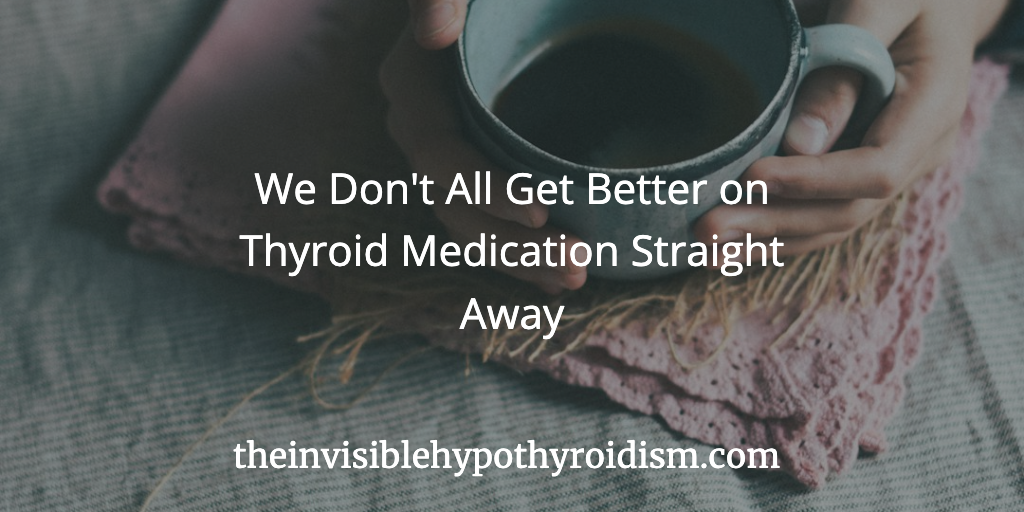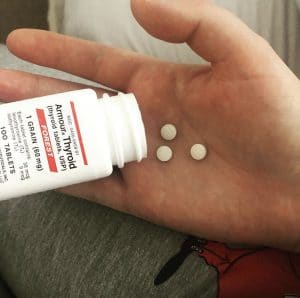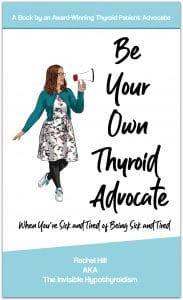Despite what many doctors or people would have you believe, not everyone starts thyroid medication for hypothyroidism and feels better soon after.
Some people do, sure (and that’s great!), but as with everything in life, there are also some people who do not.
Thyroid disease is often mislabelled as being easy to treat or easy to live with and there are many misconceptions about it among the general public, and even doctors. It’s not always easy to treat and those of us who do not suddenly feel better on thyroid medication deserve to be heard and believed. We’re not all the same and we don’t all have the same experiences.
But we do deserve to get back to good health via further investigation.
Whether it means trying a different type thyroid medication, investigating other possible issues such as vitamin deficiencies or other hormonal imbalances and more – know that if you’ve started thyroid medication, even been on it for a while, and don’t feel better, that you’re not alone and you’re not crazy or a hypochondriac. It’s not all in your head.
Here are some reasons why you may not feel better yet:
Your Thyroid Levels Aren’t Optimised
Optimal thyroid levels are discussed here.
If your TSH, Free T3, Free T4, TpoAb, TgAb are not optimal, it could well be why you still don’t feel well and have ongoing issues or symptoms. Even mental health ones. Many thyroid patients are realising that being ‘in range’, ‘fine’ or ‘normal’ is very different to having their levels optimised. Taking thyroid hormone levels from simply being ‘in range’ to being optimised can make a world of difference.
Put simply, when your doctor conducts thyroid testing and you get the results, optimal levels are the results that a lot of thyroid patients state they feel best at. This is a place within a given ‘range’. So it’s not just about falling within a wide range. It’s more narrow and specific. Read more here.
You can find online tests for thyroid function here and here.
You Need a Different Thyroid Medication
Chances are, you’ve been started on T4-only medication such as Synthroid or Levothyroxine, which does admittedly work for some people, but not all. Some thyroid patients find that they require T3 medication or Natural Desiccated Thyroid in order to feel well. As with everything, we’re all different and our needs can differ too.
There are different brands of thyroid medication too. You could try another brand to see if one works better for you.
You Have Poor Adrenal Health
Adrenal dysfunction seems very common with hypothyroidism. If you have any symptoms of adrenal issues, such as fatigue, weight gain, sleep disruptions… then you may benefit from completing a saliva test to check for them. Addressing any adrenal dysfunction helps many people to feel well again.
If your doctor won’t check your adrenals, you can order testing yourself here and here.
You Have Vitamin Deficiencies or Low Levels
You may find that you have one or more low or deficient vitamin levels as well as hypothyroidism. Many of us also have low Iron, Vitamin D, B12 and folate levels.
It’s worth checking these especially if you are tired a lot, have hair loss, bruise easily, get fatigued easily etc.
If you’re wondering which vitamins to consider supplementing, have a read here. However, it is advised not to supplement anything until you’ve confirmed you are low or deficient through testing.
Your Hashimoto’s isn’t Addressed
Have you checked if you have the autoimmune disease Hashimoto’s Thyroiditis?
Hashimoto’s causes around 90% of hypothyroidism cases, yet often goes untested and it is good to know if you have this because if you do, there are things you can do to lower the antibodies, and keeping antibodies low is important if you want to stop any further damage being done to your thyroid gland, and want to feel well.
You Have Food Sensitivities
Your diet can play a big part in how you feel. Many thyroid patients state they feel better when they cut out gluten. Others include alcohol, goitrogens, soy, grains, eggs and dairy.
However, I do urge people to use caution when it comes to removing foods from their diet. Being super restrictive isn’t great either. Read my info in full here.
You Have Poor Gut Health
Increased intestinal permeability and candida (a yeast overgrowth) is reportedly very common with hypothyroidism and especially Hashimoto’s patients, since poor gut health often cited to be in place to trigger the condition in the first place. Addressing my gut health was one of the biggest pieces of my puzzle.
A UK test for Candida can be found here. and a US test here.
***
As well as all of these possible reasons why you may not be feeling well despite being on thyroid medication, it is also worth mentioning that for some people, it can just take a while to get their medication dosage right for them. For some, this can take months.
Related Article: The Thyroid Jigsaw Puzzle
Did you get better quickly once on thyroid medication? What was your experience?
See also:
The book Be Your Own Thyroid Advocate: When You’re Sick and Tired of Being Sick and Tired, which builds on this article in detail. Reclaim your thyroid healthy life.
You can click on the hyperlinks in the above post to learn more and see references to information given.






